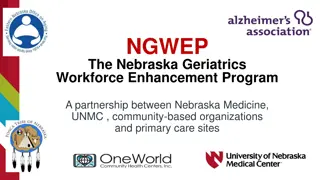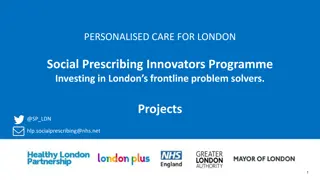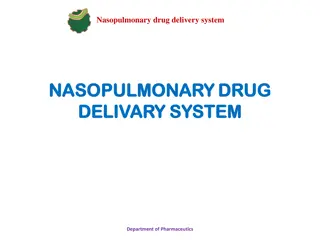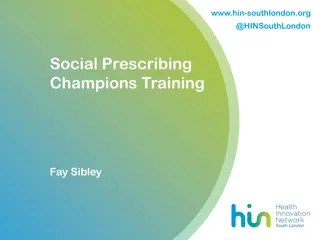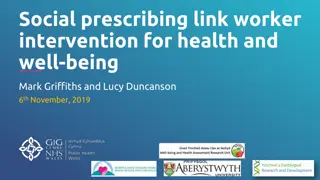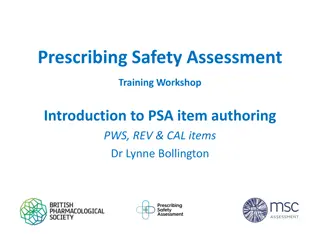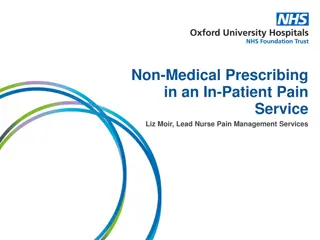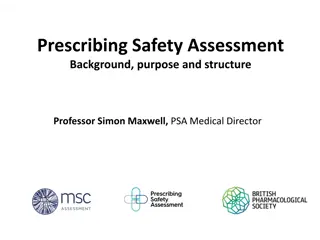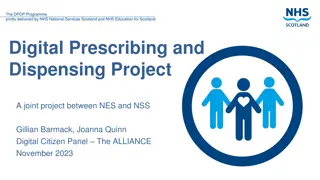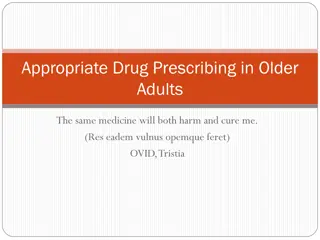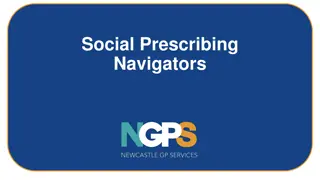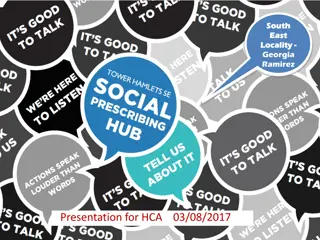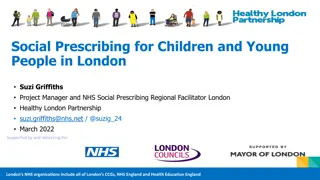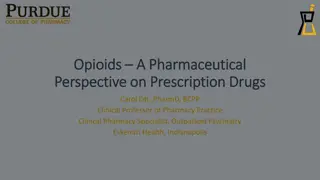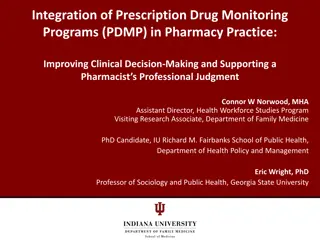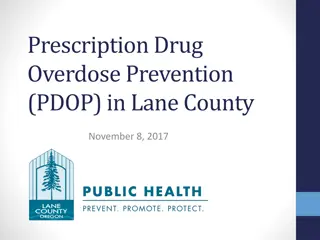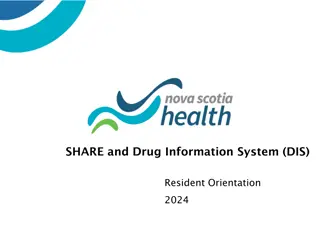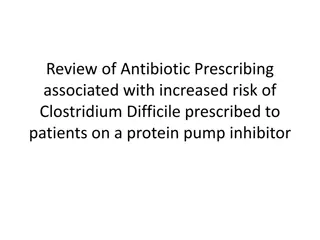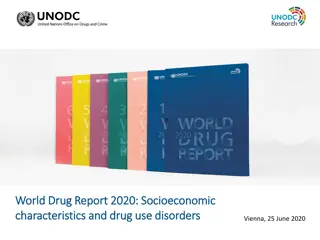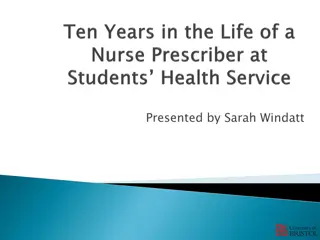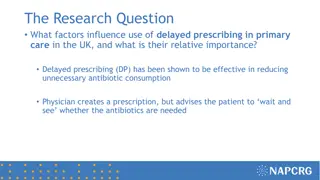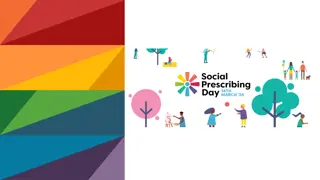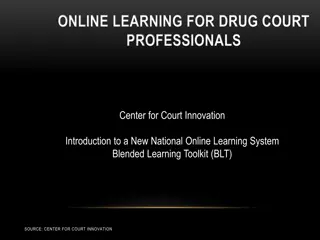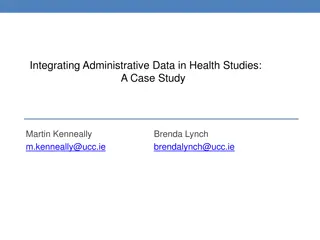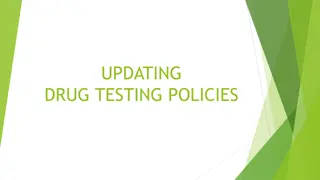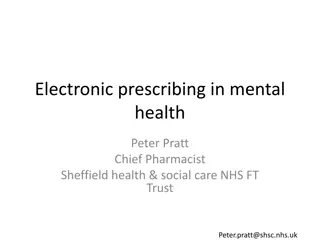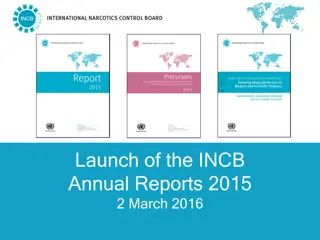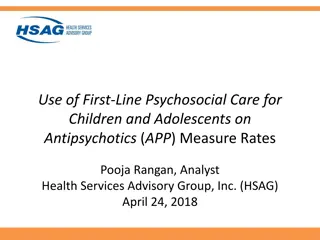Patient Voices for Social Prescribing Programme Overview
Patient Voices for Social Prescribing Programme aims to empower individuals with lived experience of social prescribing to share their stories effectively. The program includes storytelling sessions, peer support, case study development, and opportunities for participants to advocate for social pres
6 views • 7 slides
Optimizing Geriatric Pharmacotherapy: Challenges and Considerations
This content elaborates on the Nebraska Geriatrics Workforce Enhancement Program, supported by HRSA, focusing on age-friendly primary care and the 4Ms approach to medication management in older adults. It addresses the objectives of understanding factors affecting drug use in the elderly, recognizin
1 views • 42 slides
Polymeric Controlled Drug Delivery Systems
Polymeric controlled drug delivery systems play a crucial role in regulating drug release through diffusion, solvent penetration, and chemical mechanisms. These systems include diffusion-controlled, solvent-controlled, and chemically-controlled devices, each operating based on specific principles. S
0 views • 33 slides
Social Prescribing Innovators Programme in London
The Social Prescribing Innovators Programme in London aims to support frontline problem solvers in developing and implementing innovative solutions to address healthcare challenges through social prescribing. With a focus on holistic approaches to enhance health and wellbeing while relieving pressur
0 views • 17 slides
Understanding Nasopulmonary Drug Delivery System
Nasopulmonary drug delivery system, utilizing the nasal route for drug administration, offers advantages such as hepatic first-pass metabolism avoidance and rapid drug absorption. This system is beneficial for pharmacologically active compounds with poor stability in gastrointestinal fluids. While i
0 views • 35 slides
Understanding Formulary Systems in Healthcare
A formulary is a dynamic list of medications curated by healthcare professionals to guide drug selection based on efficacy, safety, cost, and patient acceptability. It plays a vital role in promoting evidence-based and cost-effective drug therapy, improving communication between prescribers and phar
0 views • 17 slides
Social Prescribing Champions Training Overview
Explore the Social Prescribing Champions Training program offered by HINSouthLondon, focusing on topics like the Social Prescribing model, HealthUnlocked digital platform, communication techniques, and more. Discover the aims of the project, the Health Innovation Network, and the development of prim
0 views • 51 slides
The Impact of Social Prescribing on Health and Well-being
Social prescribing involves enabling primary care professionals to refer individuals to local non-clinical services, promoting a holistic approach to health management. This practice has gained recognition for its effectiveness in empowering individuals to take control of their own well-being. Initi
0 views • 48 slides
Importance of In-Vitro Dissolution Testing in Drug Assessment
In drug development, in-vitro dissolution testing plays a crucial role in evaluating drug release from tablets when in-vivo bioavailability studies are limited. By ensuring drug release is close to 100% and uniform batch to batch, these tests help assess drug availability and effectiveness. Regulato
11 views • 10 slides
Prescribing Safety Assessment - Item Development Process Overview
In the Prescribing Safety Assessment Workshop, item authoring is a crucial process involving multiple stages such as new item creation, editing, peer review, and final assessment board approval. Copy editors and clinical reviewers ensure the accuracy and quality of item content, while peer reviewers
0 views • 32 slides
Enhancing Skills and Leadership in Non-Medical Prescribing
Support and guidance for Non-Medical Prescribers (NMPs) in developing skills, leadership, and competence. Emphasis on scope of practice, safe prescribing, governance, and the impact on service development. Importance of clinical supervision, organizational factors, and prescribing leadership for hig
0 views • 16 slides
Practical Aspects of Non-Medical Prescribing in In-Patient Pain Management
Exploring the challenges and strategies involved in non-medical prescribing within in-patient pain services, focusing on practicalities, education, COVID-19 symptom management, and improving prescribing practices. The content delves into the complexities of the in-patient pain service, the role of n
0 views • 11 slides
Improving Prescribing Safety in Medical Practice
Professor Simon Maxwell's Prescribing Safety Assessment (PSA) aims to address concerns regarding junior doctors' readiness for prescribing medications. The assessment was developed in response to high error rates in prescribing, emphasizing the importance of safe medication practices to enhance pati
0 views • 43 slides
Understanding Quantitative Aspects of Drug Action
Explore the quantitative aspects of drug action, including drug receptor binding, concentration binding curves, dose-response curves, and types of antagonism. Learn to relate drug concentration to receptor binding capacity and response produced. Discover how concentration binding curves and dose-res
0 views • 29 slides
Digital Prescribing and Dispensing Programme in Scotland
The Digital Prescribing and Dispensing Pathways (DPDP) programme in Scotland aims to transform the prescribing and dispensing process by introducing end-to-end digital solutions to replace paper prescriptions. The initiative focuses on enhancing efficiency, safety, and sustainability while incorpora
0 views • 16 slides
Appropriate Drug Prescribing in Older Adults: Balancing Harm and Cure
Understanding age-related changes in pharmacokinetics and pharmacodynamics is crucial for appropriate drug prescribing in older adults. Recognizing high-risk medications to avoid, understanding common drug interactions, and conducting regular drug list reviews are key components in providing safe an
1 views • 47 slides
Personalised Care for London Social Prescribing Innovators Programme
The Personalised Care for London Social Prescribing Innovators Programme aims to empower individuals in London to take control of their health through innovative social prescribing services. This programme offers support and funding to address challenges in delivering social prescribing in primary c
0 views • 16 slides
Understanding Social Prescribing Navigators and Their Role in Health Care
Social prescribing navigators are a vital part of the healthcare system, connecting patients with community resources to improve their health and wellbeing. This approach, known as social prescribing, targets a wide range of needs, from mental health support to social isolation. By working closely w
0 views • 18 slides
Understanding the Importance of Social Prescribing in Healthcare
Social prescribing is a valuable approach that connects individuals with local services to enhance their health and well-being. It offers a diverse range of support, from exercise groups to counseling, aimed at addressing non-medical issues like personal relationships, housing problems, and employme
0 views • 14 slides
Enhancing Children's Wellbeing Through Social Prescribing in London
Social Prescribing for Children and Young People (CYP) in London aims to address non-clinical needs impacting health and wellbeing by connecting them to community resources. With a focus on inclusivity and early intervention, the initiative seeks to mainstream CYP social prescribing across all borou
0 views • 7 slides
Understanding Opioid Misuse and Prescription Drug Guidelines
Explore the pharmaceutical perspective on prescription opioids, the impact of pain as a vital sign, sources of misused prescription opioids, non-medical use statistics, heroin trends, and CDC guidelines to limit opioid prescribing. Gain insights on the complexities surrounding opioid misuse and the
0 views • 11 slides
Understanding e-Prescribing Basics with SureScripts
Explore the fundamentals of e-prescribing with SureScripts, covering key concepts such as prescriber terminology, prescription processing, error handling, prescriber registration requirements, and service levels. Gain insights into the different levels of e-prescribing capabilities and how to regist
0 views • 12 slides
Integrating PDMP in Pharmacy Practice: Enhancing Clinical Decision-Making
The integration of Prescription Drug Monitoring Programs (PDMP) in pharmacy practice plays a crucial role in improving clinical decision-making and supporting pharmacists' professional judgment. By discussing the pharmacist's role in dispensing controlled substance prescriptions, assessing the impac
0 views • 40 slides
Comprehensive Overview of Prescription Drug Overdose Prevention Efforts in Lane County
Efforts in Lane County to prevent prescription drug overdose include forming alliances, organizing educational sessions for prescribers, promoting Naloxone access, and engaging with the community and law enforcement. Initiatives also involve monitoring and addressing risky prescribing practices and
0 views • 13 slides
Nova Scotia Drug Information System (DIS) Overview for Patient Safety
Nova Scotia's Drug Information System (DIS) focuses on patient safety by minimizing adverse events related to drug interactions, contraindications, and medication errors. The system includes comprehensive medication profiles, allergy alerts, and e-Prescribing capabilities to aid healthcare providers
0 views • 14 slides
Antibiotic Prescribing Impact on Clostridium Difficile Risk in Patients on Protein Pump Inhibitors
Antibiotic prescribing in patients on protein pump inhibitors (PPIs) is associated with an increased risk of Clostridium difficile infection. A review was conducted on high-risk antibiotic prescriptions, revealing instances where patients were prescribed against guidelines, leading to potential comp
0 views • 5 slides
Impact of Socioeconomic Conditions on Drug Use Disorders: Insights from World Drug Report 2020
The World Drug Report 2020 highlights the strong correlation between socioeconomic factors and drug use disorders. Studies reveal that communities facing poverty, violence, and social inequality are at a higher risk of drug overdoses and addiction. Factors like income inequality, lack of social capi
1 views • 17 slides
Understanding Targeted Clinical Investigation in Pharmacovigilance
Targeted clinical investigation plays a crucial role in pharmacovigilance by further evaluating significant risks identified in pre-approval clinical trials. This involves conducting pharmacokinetic and pharmacodynamic studies, genetic testing, interaction studies, and large simplified trials to ass
0 views • 12 slides
Evolution of Nurse Prescribing: A Career Transformation
In 2004, Sarah Windatt became an Independent Nurse Prescriber, marking a significant shift in her career. Her journey from starting at a Students Health Service in 1996 to embracing new prescribing responsibilities reflects the evolution of nurse prescribing over the years. The narrative captures th
0 views • 34 slides
Challenges in Prescribing the Right Antimicrobial Agents
Prescribing the appropriate antimicrobial medication can be a daunting task due to various factors. In this case discussion, the patient is on multiple medications for different conditions, making it essential to carefully consider the choice of antimicrobial. Factors such as drug interactions, pati
0 views • 30 slides
Factors Influencing Delayed Prescribing in UK Primary Care
Factors influencing delayed prescribing in UK primary care were examined through a study involving general practitioners (GPs) and prescribing scenarios for respiratory tract infections. Clinical features, patient preferences, and practitioner tendencies were key factors affecting the decision to pr
0 views • 5 slides
Advances in Ophthalmic Drug Delivery Systems
This content explores various advanced ophthalmic drug delivery systems including erodible ophthalmic inserts, soluble ocular drug inserts, new ophthalmic drug delivery systems, and bioadhesive ophthalmic drug inserts. These innovative systems aim to provide accurate dosing, prolonged drug release,
0 views • 8 slides
Social Prescribing: Connecting People to Non-Medical Support
Social prescribing is a holistic approach that addresses non-medical factors impacting health by connecting individuals to tailored support services. This method aims to tackle loneliness, isolation, stress, financial issues, and mental health difficulties through activities such as joining communit
0 views • 15 slides
Innovative Online Learning for Drug Court Professionals
Center for Court Innovation has introduced a new National Drug Court Online Learning System aimed at assisting drug court professionals. This system offers free access to web-based training, expert video lessons, virtual site visits to drug treatment courts, practitioner interviews, and a resource l
0 views • 8 slides
Integrating Administrative Data in Health Studies: A Case Study
This case study explores the integration of administrative data in health studies focusing on profiling the health status of Irish regions in 2010. The objectives include linking regional health profiles to prescribing patterns, incorporating demographics and drug scheme coverage rates, and simulati
0 views • 17 slides
London Social Prescribing Innovators Programme Workshop
Join the London Social Prescribing Innovators Programme workshop to learn about the programme, application process, support offered, and network with others in the field of Social Prescribing. Get insights on writing successful applications, funding breakdown, and brainstorming solutions for common
0 views • 21 slides
Understanding Drug Testing Policies in the Workplace
The Drug-Free Workplace Act of 1988 mandates federal grant recipients to implement zero-tolerance drug policies to maintain a drug-free environment. Employers must establish clear policies, conduct awareness programs, offer counseling and rehabilitation services, and impose penalties for violations.
0 views • 19 slides
The Future of Electronic Prescribing in Mental Health
Electronic prescribing is a key element of the NHS's paperless initiative, aiming to improve accuracy and efficiency in medication management for mental health patients. Benefits include increased safety, reduced errors, and better communication between healthcare providers. However, challenges such
0 views • 14 slides
Overview of International Drug Control Efforts and Challenges in 2015-2016
The content highlights significant events related to international drug control efforts, emphasizing the launch of the INCB Annual Reports, the UNGASS session at the United Nations, and the focus on health, welfare, and challenges in combating drug abuse. It discusses issues such as new psychoactive
0 views • 13 slides
First-Line Psychosocial Care for Children and Adolescents on Antipsychotics: Performance Measure Results
The performance measure assessed the use of first-line psychosocial care for children and adolescents on antipsychotics in Virginia, showing a total measure result of 68.98%. The measure aims to promote safer interventions before prescribing antipsychotic medications to minimize risks. Results were
0 views • 25 slides

